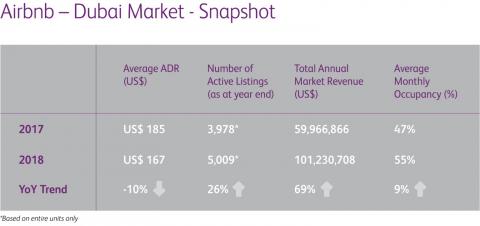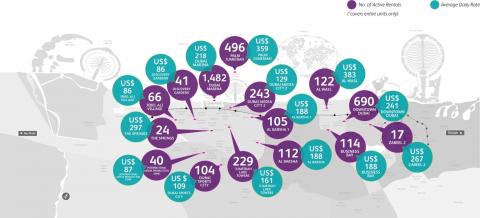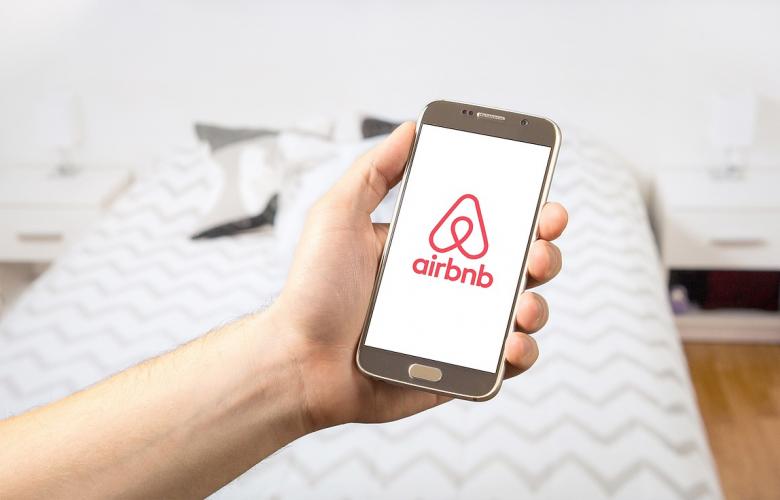Dubai's Airbnb market worth over US$101 million
Feb 21, 2019
Dubai's Airbnb market worth over US$101 million
A new report by Chestertons MENA reveals 2018 saw a year-on-year increase of 69 per cent in market revenues with the Airbnb market now generating over US$101 million in the Emirate.
The 2018 data revealed revenues for properties listed on the online community marketplace increased by 69 per cent compared to the previous year, reaching US$101,230,708.
As of December 2018, active listings had increased by 26 per cent to 5,009 units compared with 2017 during which 3,987 units had been listed and increased by a whopping 81 per cent compared with 2016 when there were just 2,775 units listed on the site. Active listings in the report are based on entire units, as per current legislation.
The report also outlines that demand has supported the increase in available units with average occupancy levels reaching 65 per cent during Dubai’s peak season in (March) 2018.

Source: Chestertons
During the same period in 2017, occupancy levels were at 50 per cent. During the low season months of June, July and August 2018, occupancy averaged 49 per cent which was higher than the same period in 2017 where occupancy averaged just below 40 per cent.
“Looking at the increase in listings in the last nine years, we can see a meteoric rise from just two in 2010 to 5,009 by December 2018 which has resulted in Airbnb’s market value growing exponentially to over US$101 million as at the end of last year,” said Ivana Gazivoda Vucinic, Head of Advisory and Research, Chestertons MENA.
“There are a number of factors contributing to the popularity of the online platform. Dubai has a buoyant tourist market and travellers are increasingly looking for personal and authentic holiday experiences, which Airbnb can offer through ‘host’ interaction.
"The other factor is a growing number of individuals, who are either coming to the emirate for contract work, or are on probation, and cannot commit to a traditional annual rental contract as the tenancy cannot be registered if the residency visa is still to be granted. As such, holiday rentals are a practical alternative,” she added.
In terms of rental sizes, the mix ranges from studios to five-bedroom units, with one-bedroom units dominating the market and accounting for 42 per cent of supply, perhaps due to the flexibility of sleeping arrangements (2-4 people if a sofa bed is provided).

Source: Chestertons
Chestertons MENA noted in their most recent Dubai residential market report that one-bedroom properties have been particularly susceptible to market adjustments over the last 12 months which presents an opportunity for many landlords to utilise Airbnb as an attractive alternative to long-term renting.
To assist owners in managing their short-term rentals, several tools have been added to the Airbnb offering, these include a revenue management tool that adjusts pricing to adapt to seasonality and key calendar dates while also competing with similar listed properties, increasing profits further.
“There are a number of reasons why consumers are increasingly turning to Airbnb as their accommodation of choice in Dubai. Notwithstanding the cheaper daily rates and additional space available compared to a hotel room, holiday lets also offer kitchen facilities and can now compete with amenities such as communal gyms, pools, beach access and even concierge services,” said Vucinic.
The report identified Downtown Dubai, Palm Jumeirah, Dubai Marina, Dubai Media City 2 and Al Barsha as the densest areas for holiday home rentals, with each area commanding an Average Daily Rate (ADR) of US$241, US$359, US$218, US$129 and US$188 respectively.
Interestingly, Airbnb’s best-performing property in Dubai in 2018 was a 6-bedroom, 7.5-bathroom villa on Palm Jumeirah which accommodates up to 12 people, earning a total of US$428,436 with an ADR of US$1,433.
“As Dubai prepares for Expo 2020, we expect a significant increase in Airbnb rentals over the six-month period of the event. Due to increased visitor numbers, the Airbnb stock, coupled with the additional standard hotel stock, is expected to easily absorb the increased demand. We also expect to see a short-term spike to ADRs during this period,” added Vucinic.
Similar to this:
Contact details:
Chestertons
Email
6556
5483
Chestertons




